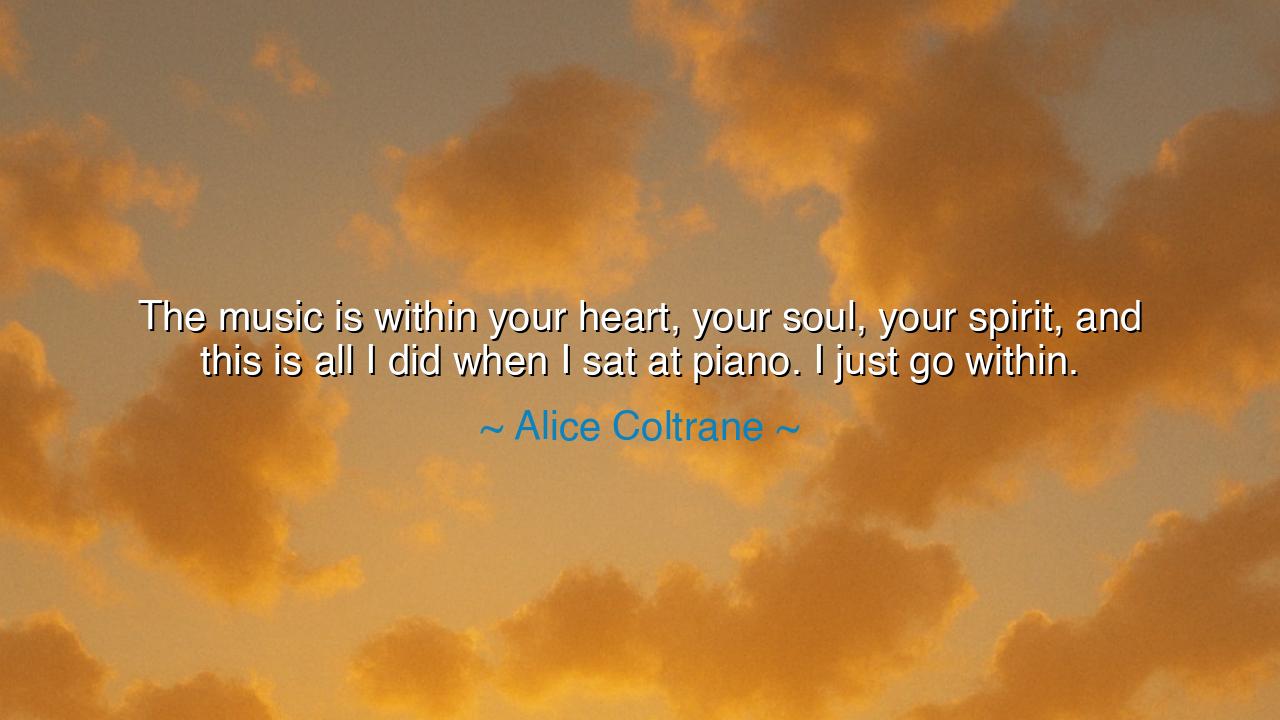
The music is within your heart, your soul, your spirit, and this
The music is within your heart, your soul, your spirit, and this is all I did when I sat at piano. I just go within.






The mystic and visionary musician Alice Coltrane once revealed the source of her art with these words: “The music is within your heart, your soul, your spirit, and this is all I did when I sat at piano. I just go within.” In this truth, she unmasks the deepest secret of music—that it is not born from the instrument, nor from the written score, but from the innermost chambers of the self. For the heart, the soul, and the spirit are themselves instruments, waiting to be played by the one who dares to turn inward.
To say that music is within your heart is to remind us that sound is not merely external. The beating of the heart is the first rhythm a child hears in the womb, and all melodies after are echoes of that primal beat. To create music, then, is to return to the essence of life itself. When Coltrane sat before the piano, she did not seek outside approval or follow only technical instruction—she listened to the rhythm already pulsing within her, and allowed it to flow through her hands.
She also speaks of the soul, that eternal flame within each being. The soul does not know notation or genre; it knows longing, joy, grief, and awe. Music born of the soul carries truth so profound it transcends language. Consider how Coltrane’s own compositions after the passing of her husband, John Coltrane, became meditations—pieces that sound less like performances and more like prayers. They arose from her soul’s need to speak where words could not. In this way, her music was not entertainment, but revelation.
And then there is the spirit, the dimension beyond flesh and thought, where one touches the divine. When Alice Coltrane declares, “I just go within,” she speaks as a seeker. For her, playing music was a spiritual practice, a journey inward toward communion with the eternal. Just as monks chant or sages meditate, she sat at her piano and traveled into the silence of her own being, bringing back melodies as gifts. Her harp and her piano became like temples, and her music, the voice of her prayer.
History gives us kindred examples. When Beethoven, already deaf, composed his late quartets, he was not writing for the ears of men but for something higher. His music came not from what he could hear outside, but from what thundered within. Similarly, in India, the raga tradition has always taught that the musician does not invent music but uncovers it by entering inward, tuning body and spirit to the eternal vibration of the universe. Alice Coltrane’s wisdom stands firmly within this lineage of truth.
The lesson is profound: true creation begins not in chasing the noise of the world, but in listening to the stillness within. Each of us carries rhythms, melodies, and harmonies in our being, whether or not we play an instrument. To live deeply, we must go within—to know our heart, to hear our soul, to commune with our spirit. Only then can we bring forth works, whether of art or of life, that are authentic and enduring.
Practically, this means: cultivate silence in your life. Sit quietly and listen to yourself before you create, before you act, before you speak. Do not fear the inward journey, for there you will find not emptiness but abundance. When you work, whether with music, with words, or with your hands, let it come from your heart and not only your mind. In doing so, your actions will carry truth, and those who encounter them will feel the resonance of your spirit.
So let Alice Coltrane’s words echo like a guiding hymn: the music is not outside, but within. Do not search for it in distant places, but enter into the sanctuary of your heart. There you will find a song that belongs only to you, and if you are brave enough to share it, you will give the world a glimpse of the eternal.






AAdministratorAdministrator
Welcome, honored guests. Please leave a comment, we will respond soon